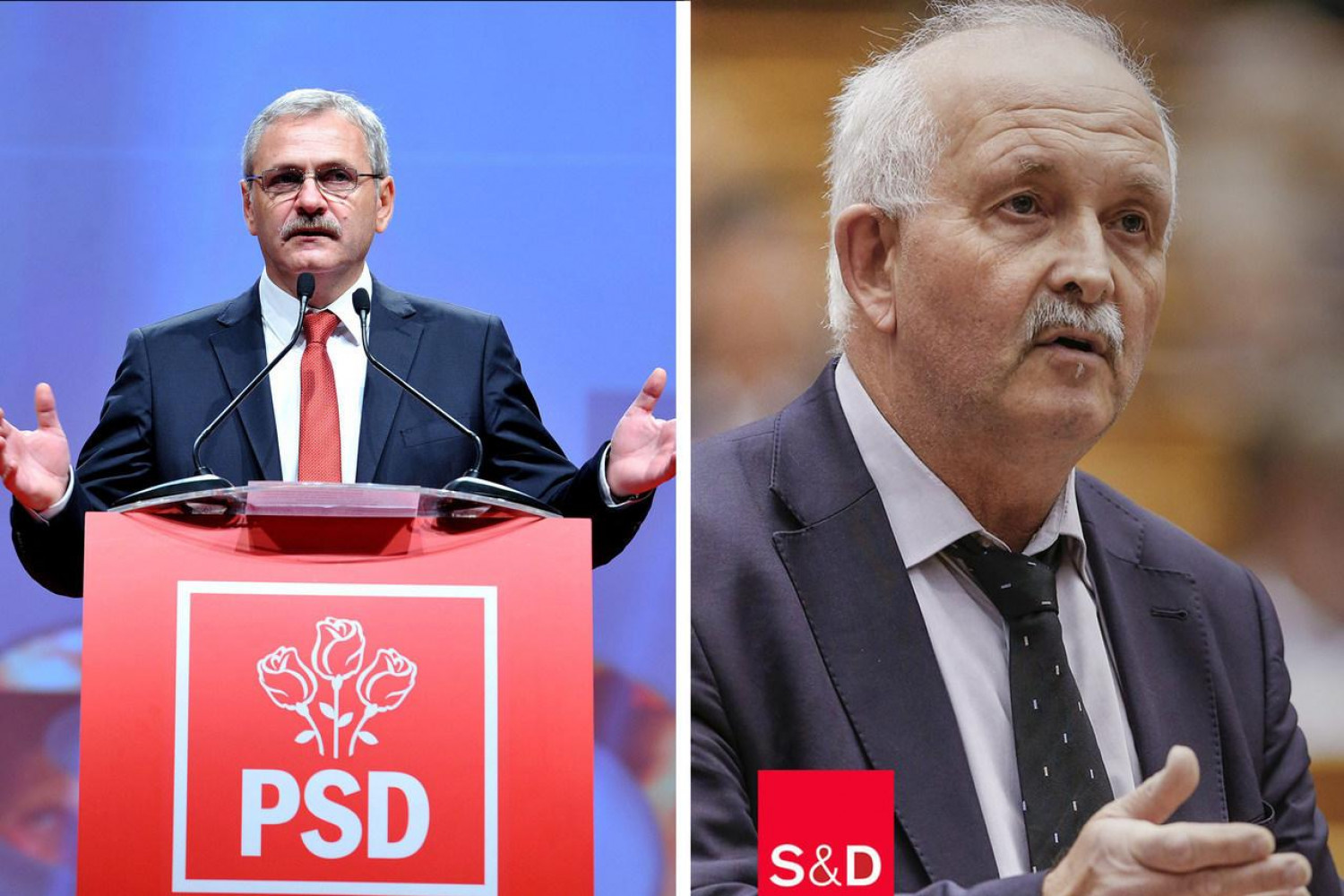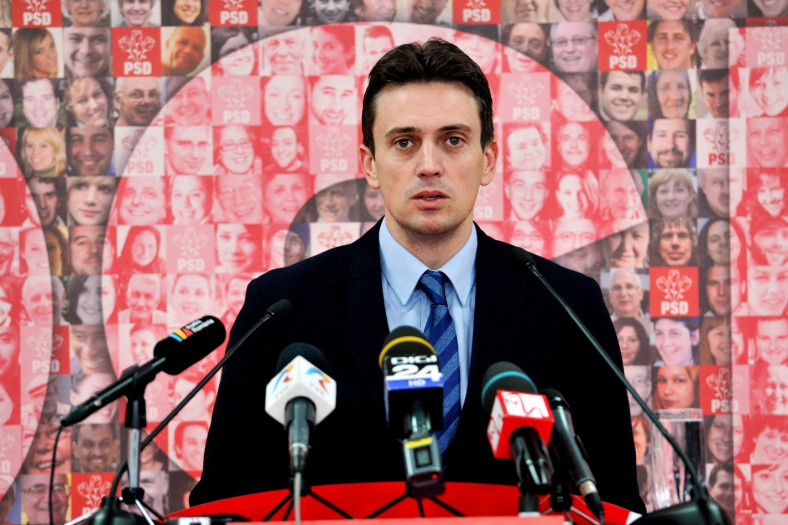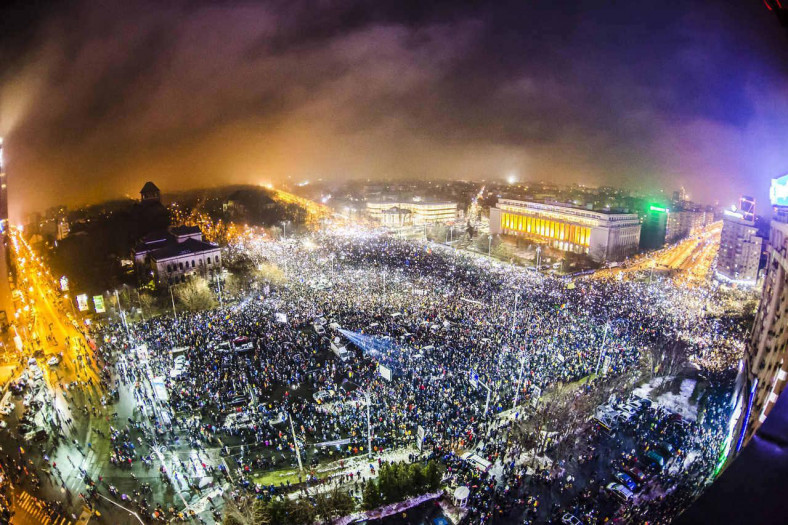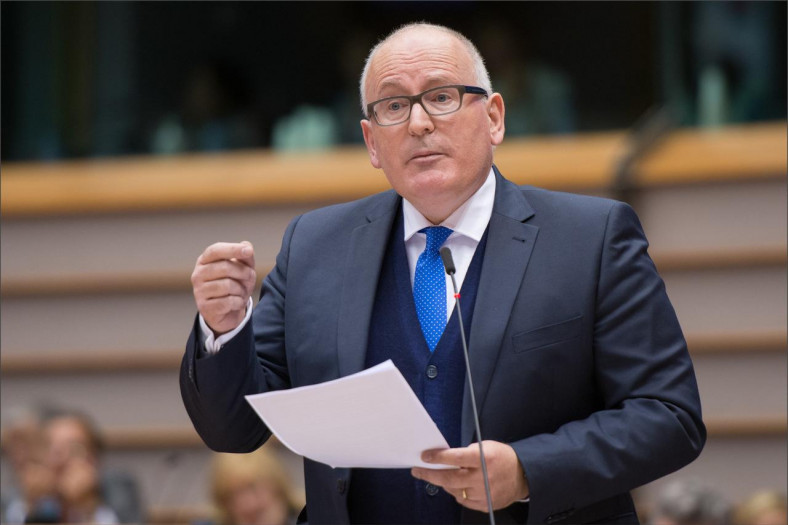Pieter Stockmans volgt het mondiale optreden van de Europese Unie, het Europese vluchtelingenbeleid, de evoluties in Midden-Europa en de regio ten oosten van de EU.
Social democrats voted in favour of sanctions against Hungary. What about autocrats in their own ranks?

Left: Liviu Dragnea, president of the Romanian PSD. Right: Udo Bullmann, president of the S&D in the European Parliament.
Partidul Social Democrat from Romania (cc-by-2.0) / S&D
The Progressive Alliance of Socialists and Democrats (S&D) in the European Parliament today voted in favour of the sanctions procedure against Hungary. They also want the European People’s Party (EPP) to exclude the party of Hungarian prime minister Viktor Orbán. The leadership of the S&D however remains silent on an authoritarian party within its own ranks: the Romanian PSD.
This party is copying Orbán in undermining the rule of law. This appears from their political measures and propaganda, and from the fact that the PSD works with the same political advisors as Orbán.
After a lowering of penalties for corruption offenses – the Romanian Parliament pushed through a controversial amnesty law in less than three days – and the dismissal of the anti-corruption top executive in July, as well as the violent suppression of the mass anticorruption protests of August 10 in Bucharest, the S&D did not react. Not even a short statement on Twitter.
MO* has tried to contact S&D president Udo Bullmann, but he was busy on the debate on threats to the rule of law in Hungary.
‘A concerted attack on checks and balances in a democracy’, S&D president Udo Bullmann said about Hungary. He did not say anything about the Romanian PSD.
‘A concerted attack on checks and balances in a democracy’, Bullmann said about Hungary. He did not say anything about the Romanian PSD. This could give rise to the impression that the vote against Viktor Orbán in the European Parliament is first party politics, and only then a defense of the rule of law.
Bullmann is aware of the situation in Romania thanks to the briefings of his own members of Parliament, PSD-dissidents Daciana Sarbu and Catalin Ivan. Ivan launched a petition online to exclude his own party PSD from the S&D.
He told Bullmann that the actions of the Romanian government are also a ‘concerted attack’ against the ‘institutions that are supposed to garantuee checks and balances on the government in a liberal democracy’. That is Bullmanns press statement on Hungary, but it goes for Romania as well.
On Monday, Catalin Ivan sent another internal e-mail within the S&D, with a letter directed to Bullmann: ‘To postpone the discussion about the PSD within our group, is the same as consenting silently with one of the most harmful regimes of Europe today. I am asking once more to exclude the PSD from the S&D.’
Three of sixteen PSD-members of European Parliament have left the PSD. They now sitting in the European Parliament and the S&D as independents.
Daciana Sarbu resigned from the PSD two months ago. She regretted that people in the party were afraid to speak out against authoritarian leader Liviu Dragnea. Dragnea’s criminal conviction, as well as his attempts to submit the judiciary and his appointment of puppet prime ministers, were a bridge too far for her. The violent suppression of the protests of August 10 was the last straw.

PSD-dissident Catalin Ivan when he was still a member of the PSD in 2013.
Partidul Social Democrat
Ultimatum
In March, Kathleen Van Brempt (sp.a), the only Flemish Europarliamentarian in the S&D, was a candidate to become president of the S&D. Udo Bullmann was the other candidate. Bullmann is a member of the German SPD, the second largest group in the S&D, with 27 Europarliamentarians.
Bullmann won the elections. However, Van Brempt did get 40% of the votes. The S&D was divided between a large group who wanted to ‘leave everything as it was’ – someone of a large country in a key position – and an almost equally large group who were longing for something new.
Striking: the Romanian PSD voted for Bullmann, while all PSD-dissidents voted for Van Brempt. Even though the German SPD had been very critical of the Romanian PSD before, Bullmann had now needed the PSD to become president. Not favourable for “something new”.
PSD-dissident in internal e-mail to president Bullmann: ‘If the S&D does not exclude the PSD, I will resign. Every day with the PSD in our ranks is damaging our common values.’
‘If I had become president, I would have sent a delegation of our Europarliamentarians to Romania to go and speak with the leaders of the PSD, as well as to the NGOs who mobilise for the protests’, says Van Brempt.
‘What we need is a many-sided study on what is going on. Because to be honest, we do not always know what is going on in the countries of our Europarliamentarians. Each time Romania is receiving bad press, we get internal briefings and e-mails from PSD Europarliamentarians to sow doubts. But you cannot run from a conviction for corruption. Period.’
In two weeks, “the situation in Romania” is on the agenda of the internal meeting of the S&D. The Danish social-democrats took the initiative, but there is no many-sided study. The Romanian prime minister herself has been invited to come and explain her governments actions at the plenary meeting of the European Parliament in October. It was the Greens who asked for that.
PSD-dissident Catalin Ivan issued an ultimatum. If the S&D does not exclude the PSD after these debates, he will resign from the S&D. ‘After 15 years of left-wing politics and 9 years of work for freedom, solidarity and anticorruption, I believe that each day with the PSD in our ranks is harmful to our common struggle’, he states in an internal e-mail to president Bullmann.
21 million euros of EU subsidies embezzled
In February 2017, half a million Romanians participated in street protests, the largest protest in Romanian history. The Romanian minister of Justice and the minister of European Affairs came to Brussels to explain things to the S&D group in the European Parliament.
Claude Moraes, Europarliamentarian for the British Labour Party and even chair of the Justice Committee in the European Parliament, only quoted the Romanian government position and did not mention the concerns of the Romanian anticorruption NGOs, even though they are the potential constituency of a progressive European party.

The anticorruption mass-protests of February 2017 in Bucharest were the largest in Romanian history. On 10 August 2018 one hundred thousand people again took to the streets.
Adrian Catu | Documentaria.ro
Others fear that the S&D would collapse if they were to exclude the large Romanian PSD. After Brexit, the PSD is the second largest group in the S&D. On the eve of the European Parliament elections of May 2019, it is an argument with considerable weight.
Collaborators of the PSD-dissidents are regretting this attitude. ‘After May 2019, we may keep our seats in parliament, but what for? For the yes-men who only take care of Dragnea’s business?’, one of them tells MO*.
‘The Bulgarian chair of the Party of European Socialists considered the Romanian PSD to be an example to social-democrats to win elections. Must the S&D really hope for an election victory of a party lead by a convicted politician who is being investigated for the embezzlement of 21 million euros in EU subsidies? To exclude such a party could actually be the signal that is needed to show voters that social-democracy represents progressive ideals instead of power politics.’
PSD-leader Liviu Dragnea and other convicted politicians are trying to avoid criminal charges or to get amnesty. The last two years the European Anti-Fraud Office (OLAF) investigated 32 cases on fraud with EU subsidies in Romania.
Dragnea’s construction company embezzled 21 million euros of subsidies from the European Regional Development Fund (ERDF) for road construction in Romania, on which OLAF conducted two investigations. They decided that the EU Directorate-General of Regional Policy had to reclaim the money from the Romanian government and that the Romanian Anticorruption Directorate had to take legal action.
Chief prosecutor Laura Kovesi opened a criminal investigation. OLAF cannot carry out judicial acts in EU member states. The effectiveness of OLAF’s work depends on an independent judiciary in the member states. That is why its investigations on corruption in Hungary almost never lead to prosecution. There, the chief prosecutor is a loyal ally of prime mimister Viktor Orbán.
Then, in Romania, on July 9, 2018, chief prosecutor Kovesi was dismissed by the Romanian government. ‘If the current PSD leadership manages to get one of their own allies appointed in that position, the fight against corruption will be over’, says Sergio Miscoiu, Professor at the University of Cluj-Napoca. At this moment it is not clear whether the investigation against Dragnea will be continued. OLAF’s press office could not answer our question on whether or not they are worried by this development.
Romania under supervision
The S&D knows that Romania is under supervision of the European Commission and that the PSD is not leading the country in the right direction. This is literally mentioned in the annual Commission Reports on corruption and the rule of law in Romania.
The Commission may not think of imposing sanctions like they did on Poland, but it does express concern. ‘The independence of the judiciary and the possibility of fighting corruption, are crucial’, explains Christopher Wigand, spokesperson of the European vice-president Frans Timmermans, to MO*.
In the most recent Commission Report on corruption and the rule of law in Romania, the Commission called the Anticorruption Directorate under Laura Kovesi ‘independent’ and ‘capable to continue its track record under challenging conditions’. But now Kovesi has been dismissed.
On that, the report states: ‘If however those challenging conditions start to affect the fight against corruption, the Commission will have to re-evaluate.’
Romania and Bulgaria are both under supervision of the European Commission because they were not ready to become members of the EU in 2007. Eventually they did become members, only because they agreed to accept the so-called Cooperation and Verification Mechanism.After more than ten years under supervision of the European Commission, of which eight under the PSD, Romania is again reversing progress. Not a big success for the S&D.
Each year the Commission writes a report on the progress or deterioration in building state institutions. The Commission is setting standards that have to be met ‘irreversibly’ in order to end the supervision: progress cannot be reversed. Earlier attempts to vote an amnesty law were such an reverse step, according to the Commission.
‘None of the standards have been sufficiently met at this moment’, according to the most recent report of January 2017. As well as: ‘Without a loyal cooperation between State institutions, those standards will not be met.’
Since that report, the government and the parliamentary majority tried to dismiss the president because he tried to block the amnesty law and the dismissal of Kovesi.
On July 10, 2018, a day after Kovesi’s dismissal, Timmermans and president of the Commission Jean-Claude Juncker met with the Romanian prime minister in Brussels. ‘Progress cannot be reversed’, it sounded diplomatically in front of the cameras.
Behind the scenes however, it was clear that the EU supervision of Romania would not be ended, even after more than ten years, of which eight under the PSD.
Not a big success for the S&D group in the European Parliament. But neither for Juncker. He was hoping to end his mandate in 2019 with a Romanian success story, as he declared at the beginning of 2018 during a meeting with the Romanian president.

Frans Timmermans, vicepresident of the European Commission, speaks on 26 April 2017 in the European Parliament on the situation in Hungary.
© European Union 2017 — European Parliament (CC BY-NC-ND 2.0)
Firm, but powerless
The Commission is not mislead by PSD-propaganda against the judiciary: ‘The constant attacks on the judiciary in the public debate in Romania are paving the way for its submission. We are waiting for the government to acknowledge this publicly and to discourage the open attacks on the independence of the judiciary.’
The Commission explicitly acknowledges the importance of an active civil society and of the organisations behind the protests, while in Romania some mass-media are branding them as traitors.
The question is whether there will be severe consequences to the bad reports. In other words: what does Romania still want from the European Commission that can be held back if they will not meet the standards?
‘It is always the same story’, says Professor Miscoiu. ‘Before the accession of countries such as Poland, Hungary and Romania to the EU, European institutions had a strong leverage. After all, these countries wanted to become members, which was only possible if standards were met. But once a member, that leverage disappears and those standards can be reversed without consequences.’
Why not say: no joining the Schengen Area as long as the standards of the rule of law are not met?
There is a thing that Romania still wants from the EU: to join the Schengen Area. The Commission could say: no joining the Schengen Area as long as the standards of the Cooperation and Verification Mechanism are not met.
‘This is what some member states are saying, but the European Commission does not share that view’, says Commission spokesperson Christopher Wigand. ‘Romania is ready to join the Schengen Area. That decision, however, has to be approved by all member states.’
MO* asked Wigand why the Commission accepts the fact that they cannot put any leverage in order to protect the rule of law in member states. After all, Hungary and Poland succeeded in establishing an authoritarian system, despite all the legal steps taken by the Commission. The Romanian social-democrats are just copying that. We could not get a clear answer on which concrete measures would follow if the next Commission report would confirm that Romania is in fact threatening the rule of law.
The Commission did propose a mechanism to suspend EU subsidies to those countries if there are no independent institutions to oversee the allocation of subsidies. But it is not sure if the member states will accept such a mechanism.

Liviu Dragnea, president of the Romanian social-democrats, gives an interview to the Romanian press.
(CC BY 2.0)
Renewal or exclusion?
Without any deterrence, the European Commission seems to lose the battle for the rule of law with national governments. The S&D group could try to tackle the Romanian PSD itself.
The S&D already took internal steps to limit the influence of the PSD in Brussels. ‘When Romania wanted to move their embassy to Jerusalem, we removed PSD-Europarliamentarian Victor Bostinaru from the Israel/Palestine file’, says Kathleen Van Brempt. ‘He now no longer has anything to say about the S&D position on Israel and Palestine.’
But Van Brempt wants to go further. She wants the internal discussion, that is currently going on, to result in clear red lines.
Kathleen Van Brempt (sp.a): ‘It would be better for the PSD to end up in the opposition, so that a new generation of social-democrats could seize power in the party. If that renewal fails, we will exclude them.’
Should the PSD be excluded from the S&D, as Orbáns Fidesz party shoud according to many be excluded from the European People’s Party? ‘If parties cross those red lines, they should be excluded’, says Van Brempt. ‘Even though I am well aware of the dilemmas. Within the PSD there is a new generation of sincere, pro-European activists who want to make something of their country. We cannot throw the baby out with the bath water. But if renewal fails, there is no future for the Romanian party in our group.’
Collaborators of PSD-dissidents to whom MO* spoke, say that the PSD cannot be saved. ‘That party is no longer ours. If we stay, we will only by accomplices to a criminal who is abusing social-democracy. Renewal has been tried in the past, when Victor Ponta promoted a new generation. But under Dragnea, the old communist dinosaurs have returned. Ponta was kicked out of the party after he had turned against Dragnea and founded a new party, Pro-Romania.’
According to Kathleen Van Brempt, it would be better if the PSD ended up in the opposition, so that the progressive wing of the party or a new generation of social-democrats could seize power: ‘That is how democracy and internal party democracy work. If not, we will lose Romania for social-democracy.’
Amongst the anti-PSD protest movement in Romania, there are a lot of progressives and thus potential voters of the S&D. The paradox is that this protest movement is actually mobilising against the social-democrats.
The new generation of youngsters in Central-Europe is no longer ‘contaminated’ by the old communist mentality. They are however falling for the new authoritarianism coming up in the region. If the S&D does not react strong enough to win over this new generation for democracy, they will lose them as well for socialism.
Translated to English by Pabla Elisa Velasquez Llanos
Maak MO* mee mogelijk.
Word proMO* net als 2798 andere lezers en maak MO* mee mogelijk. Zo blijven al onze verhalen gratis online beschikbaar voor iédereen.
Meer verhalen
-
Report
-
Report
-
Report
-
Interview
-
Analysis
-
Report











 Oxfam België
Oxfam België Handicap International
Handicap International